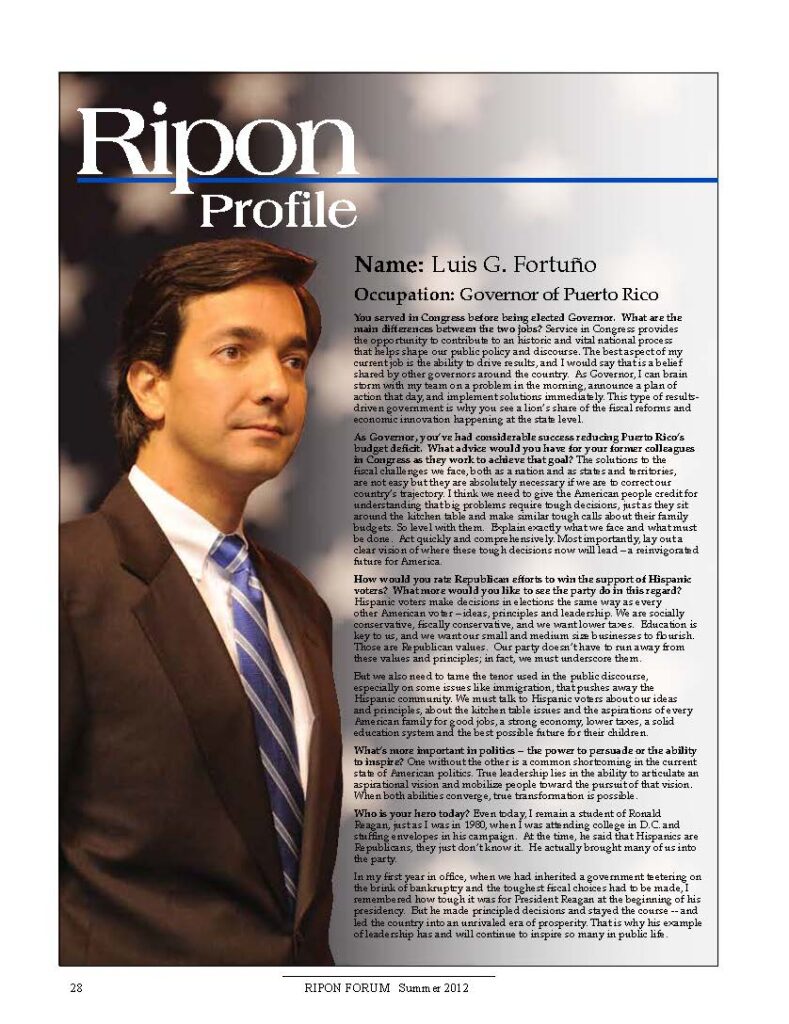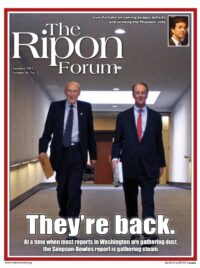
Name: Luis G. Fortuño
Occupation: Governor of Puerto Rico
You served in Congress before being elected Governor. What are the main differences between the two jobs? Service in Congress provides the opportunity to contribute to an historic and vital national process that helps shape our public policy and discourse. The best aspect of my current job is the ability to drive results, and I would say that is a belief shared by other governors around the country. As Governor, I can brain storm with my team on a problem in the morning, announce a plan of action that day, and implement solutions immediately. This type of results driven government is why you see a lion’s share of the fiscal reforms and economic innovation happening at the state level.
As Governor, you’ve had considerable success reducing Puerto Rico’s budget deficit. What advice would you have for your former colleagues in Congress as they work to achieve that goal? The solutions to the fiscal challenges we face, both as a nation and as states and territories, are not easy but they are absolutely necessary if we are to correct our country’s trajectory. I think we need to give the American people credit for understanding that big problems require tough decisions, just as they sit around the kitchen table and make similar tough calls about their family budgets. So level with them. Explain exactly what we face and what must be done. Act quickly and comprehensively. Most importantly, lay out a clear vision of where these tough decisions now will lead – a reinvigorated future for America.
How would you rate Republican efforts to win the support of Hispanic voters? What more would you like to see the party do in this regard? Hispanic voters make decisions in elections the same way as every other American voter – ideas, principles and leadership. We are socially conservative, fiscally conservative, and we want lower taxes. Education is key to us, and we want our small and medium size businesses to flourish. Those are Republican values. Our party doesn’t have to run away from these values and principles; in fact, we must underscore them. But we also need to tame the tenor used in the public discourse, especially on some issues like immigration, that pushes away the Hispanic community. We must talk to Hispanic voters about our ideas and principles, about the kitchen table issues and the aspirations of every American family for good jobs, a strong economy, lower taxes, a solid education system and the best possible future for their children.
What’s more important in politics — the power to persuade or the ability to inspire? One without the other is a common shortcoming in the current state of American politics. True leadership lies in the ability to articulate an aspirational vision and mobilize people toward the pursuit of that vision. When both abilities converge, true transformation is possible.
Who is your hero today? Even today, I remain a student of Ronald Reagan, just as I was in 1980, when I was attending college in D.C. and stuffing envelopes in his campaign. At the time, he said that Hispanics are Republicans, they just don’t know it. He actually brought many of us into the party. In my first year in office, when we had inherited a government teetering on the brink of bankruptcy and the toughest fiscal choices had to be made, I remembered how tough it was for President Reagan at the beginning of his presidency. But he made principled decisions and stayed the course — and led the country into an unrivaled era of prosperity. That is why his example of leadership has and will continue to inspire so many in public life.




